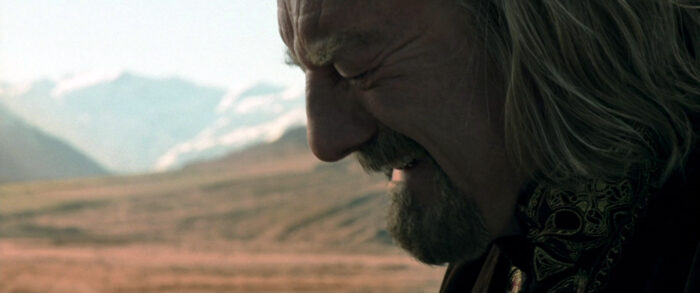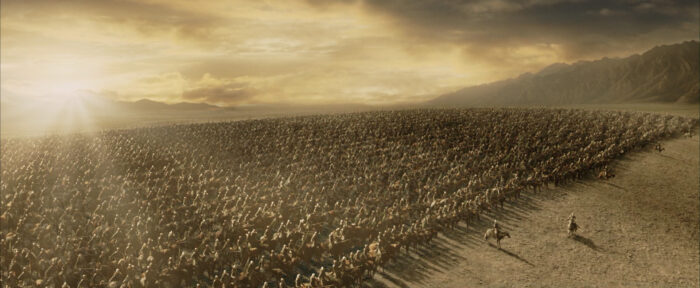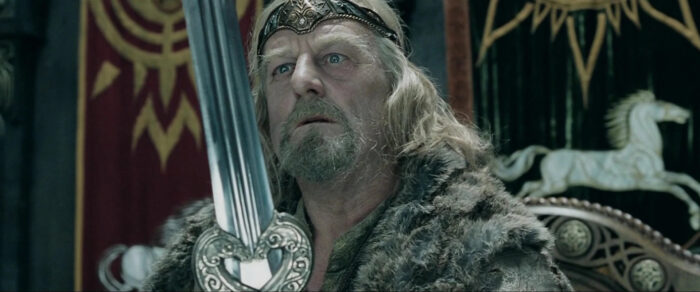Théoden King From ‘The Lord of the Rings’ Shows How We Live In A World of Loss
This week fans celebrate the twentieth anniversary of The Fellowship of the Ring movie’s theatrical release on Dec. 19, 2001. The film begins fittingly with these words: “The world is changed. I feel it in the water. I feel it in the earth. I smell it in the air. Much that once was is lost, for none now live who remember it.”1
Tolkien’s world is haunted by this sense of loss, and these markers of mourning lie as thick as the ruins Tolkien’s heroes are constantly passing. The Elves’ departure from Middle-earth. Numenor’s decline. The Ent-wives’ disappearance. The ruins of the Dwarf kingdom Moria. The ruins of Amon Hen, Amon Sul, and Osgiliath.
The Lord of the Rings has always shown this theme of loss, yet this theme has become freshly relevant in 2021, twenty years after The Lord of the Rings film director Peter Jackson renewed wider interest in Tolkien’s books.
For two years my kids have been asking me, “Will they ever give out cookies at the grocery store again?” My answer is not as poetic as Tolkien’s, yet draws from the same well: The world has changed—morally, politically, and socially. We need not look far to see many losses over the past two years.2 Such loss forces itself onto everyone’s attention.
Thankfully, Tolkien gives us not only a relatable world, but also something to hope for. This theme comes from both book and film versions. But to experience the theme’s full richness, I’ll draw from the source: all three volumes of Tolkien’s story.
Théoden plays a more central role than we thought
First, as a personal anecdote, we skip forward to The Return of the King. A few read-throughs ago, during Théoden King’s last ride, I found myself weeping. I knew the scene by heart, and had never cried before. So what suddenly moved me so much?
At the time I joked that it was my pregnancy’s fault. Jokes aside, I actually don’t think I’m alone in being moved by the king’s death. After the Battle of Pelennor Fields, Tolkien dwells with long and loving detail on Théoden’s funeral, fit for a hero. Whatever deep meaning I sensed in that scene, Tolkien clearly felt the same way.
Théoden’s kingdom of Rohan is not a major-player nation in the War of the Ring. Rohan has no representative in the Fellowship. Why, then, does Théoden matter?
One of my students unlocked this for me, in his recent paper about LOTR’s elegiac tone. He said Théoden’s arc shows an example of how people act in an elegiac world. It all clicked for me then: the student was right! In fact, Théoden is not just one example of this response; the king is the story’s best example.
Théoden incarnates the virtue of elegy
Theoden could even be the incarnation of Lord of the Rings’ elegiac atmosphere. As an aging king with a dead heir and a weakened, sidelined kingdom, Théoden embodies Middle-earth’s poignant sense of loss.
Moreover, his kingdom is based on the historical Anglo-Saxons, a culture whose worldview was fatalistic and nearly post-apocalyptic. Imagine this Viking-like tribe coming to Britain and finding only ruins left by the Romans: giant buildings, paved roads, stone arches, mosaics, things unimaginable to Anglo-Saxons with their wooden architecture. One Anglo-Saxon poet in The Wanderer describes Roman buildings as enta geweorc: “the work of giants.”
They likely felt this pressing question: If these people far greater than us could build these unfathomable things, and they’ve gone extinct, what does that mean for us?
Rohan is Anglo-Saxon culture, as if Tolkien and copied-and-pasted this into Middle-earth, then used find-replace to substitute horses for boats.3 And the Rohirrim’s worldview, more than other fading and failing cultures of Middle-earth, reflects the Anglo-Saxon mindset of loss. Aragorn chants one of the Rohirrim’s songs:
Where now the horse and the rider? Where is the horn that was blowing?
Where is the helm and the hauberk, and the bright hair flowing?
Where is the hand on the harpstring, and the red fire glowing? . . .
They have passed like rain on the mountain, like a wind in the meadow;
The days have gone down in the West behind the hills into shadow.4
 Théoden well represents this culture:
Théoden well represents this culture:
“Alas!” he said, “that these evil days should be mine, and should come in my old age. . . . The young perish and the old linger, withering.”5
“The world changes, and all that once was strong now proves unsure.”6
“However the fortune of war shall go, may it not so end that much that was fair and wonderful shall pass forever out of Middle-earth?”7
Théoden first appears to have given up, believing (thanks to “encouragement” from Grima Wormtongue) that because the kingdom has lost so much, all will be lost. His attitude makes him look even feebler than he actually is. Yet throughout The Two Towers, we see him grow into a man who takes action in the face of his own despair. He loses hope at Helm’s Deep, but still rides out with Aragorn. Then he meets Treebeard, one of the oldest creatures in Middle-earth—far older than Théoden—but not too old to win a seminal battle. Later, Théoden defiantly overcomes Saruman’s lies: “A lesser son of greater sires am I, but I do not need to lick your fingers.”8
Théoden leads the charge
The king’s arc leads to his last heroic charge at the Battle of Pelennor Fields. The Rohirrim ride to aid Minas Tirith and see a city already on the verge of defeat. We view the scene through the hobbit Merry, watching Théoden struggle once again with the tide of loss that forever pulls at his life:
“[Théoden] seemed to shrink down, cowed by age. . . . They were too late! Too late was worse than never! Perhaps Théoden would quail, bow his old head, turn, slink away to hide in the hills.”9
But even as Théoden hears the defeating crack of the city’s gates blasted apart:
At that sound the bent shape of the king sprang suddenly erect. Tall and proud he seemed again. . . . he seized a great horn from Guthláf his banner-bearer, and he blew such a blast upon it that it burst asunder. . . . After him thundered the knights of his house. . . . but Théoden could not be overtaken. Fey he seemed, or the battle-fury of his fathers ran like new fire in his veins, and he was borne up on Snowmane like a god of old, even as Oromë the Great in the battle of the Valar when the world was young.10

In order to appreciate Théoden’s accomplishment, contrast this moment with Gondor’s steward Denethor, who sacrifices himself and his son on the altar of his despair. He scoffs at Gandalf: “Go then and labour in healing! Go forth and fight! Vanity.”11 Gandalf tries to reason with Denethor, but the steward can only answer, “I would have things as they were in all the days of my life. . . . But if doom denies this to me, then I will have naught: neither life diminished, nor love halved, nor honour abated.”12
Denethor, Théoden’s foil, demands to return events back to the way they were. Without that, nothing satisfies him. But Théoden makes no such demands. He rides forth with his diminished honor and his aging body and his little hope of victory—and does what he still can, though his battle charge may seem without hope.
Théoden barely lasts a page into the battle. But in his charge, he actually revives the past—even the ancient past. “Like Orome the Great” refers to the long-gone history of Middle-earth, described in Tolkien’s legendarium The Silmarillion.
Maybe, if we stop demanding to return events back to the way they were, and instead act virtuously in our own moment, we may find that the good things were never so lost. Past good can reawaken in us, if we stop lamenting its passage and look for ways to act for good in our time. After all, as Gandalf the Grey says to Frodo in the film, “All we have to decide is what to do with the time that is given to us.”
- In the film, Galadriel speaks this in voiceover, but the phrases are partially lifted from Treebeard in J. R. R. Tolkien’s third volume, The Return of the King. ↩
- When Tolkien wrote The Lord of the Rings, World War II brought home the Battle of Britain, while the world beheld the horrors of the Axis powers. ↩
- Even the language of the Rohirrim is Anglo-Saxon Old English: for example, Théoden means king, Edoras means buildings, and Meduseld means mead-hall. ↩
- The Two Towers, Ballantine, 1982, page 132. This verse is lifted almost line for line from the Anglo-Saxon poem The Wanderer. ↩
- Ibid., 143. ↩
- Ibid., 169. ↩
- Ibid., 183. ↩
- Ibid., 219. ↩
- The Return of the King, Ballantine, 1983, page 123. ↩
- Ibid., 123–24. ↩
- Ibid., 142. ↩
- Ibid., 142–43. ↩






























Ah, you are so young to be so conversant with truth, Shannon. Kudos for a terrific piece.
Thank you so much for your kind words! I’m glad for Theoden to show his quality. 🙂
Wonderful article–thank you!
So perfect for right now, makes me want to pull out the books and reread them.
“Act virtuously in our own moment” 👍🏼
great article!!!